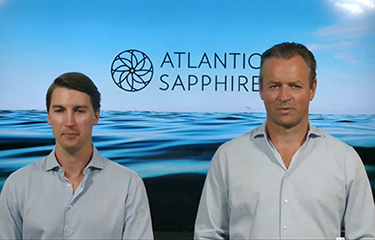Atlantic Sapphire said it expects its Q4 2023 harvest volume to drop to its lowest level since it began operating in 2020, but it insisted it is on a path toward achieving break-even earnings before interest, taxes, depreciation, and amortization (EBITDA) by the end of H1 2024.
Atlantic Sapphire, which operates a recirculating aquaculture system farm in Miami, Florida, U.S.A., announced it expects to harvest 300 metric tons (MT) of salmon in Q4 2023, and predicted a harvest volume of “around” 700 MT for the entirety of H2 2023, lower than most of its quarterly production numbers in 2021, its first full year of operation.
The firm's reduced H2 2023 harvest volume was largely related to water temperature issues leading it to undershoot its biomass targets, which it said it recently solved through the installation of water chillers. In its Q3 2023 performance update, the company said the new chillers are “proving to be effective and reliable.”
“Since the temperature issue was resolved in October 2023, the feeding has been trending up, driven by improved water quality,” it said.
With the new chillers, the company said it is targeting an EBITDA break-even for its Phase 1 operations by the end of H1 2024. The improved growth rates will bring its standing biomass to the projected Phase 1 budgeted level and in turn raise harvest volumes, it said. The improved harvests should “significantly reduce cash burn,” so long as the biological performance returns to the same levels it achieved in June 2023.
Atlantic Sapphire's Johan Andreassen, who announced in late October he is planning to step down as CEO in the next six to 12 months, said farm's operational stability was a motivating factor in his decision.
“The farm now is, for the first time ever, in a stage where we have a fair chance to be measured on production KPIs for the period ahead of us, and the crazy period of getting out of the ground is finally coming to an end,” Andreassen said in the company’s Q3 2023 presentation.
Andreassen said that for a brief period in 2023, the company saw stable conditions, low mortality, and high growth rates – but the water temperature issues derailed that progress.
“This resulted in slower growth and restricted feeding, effectively pushing the ramp up in harvest volumes and revenue out in time,” he said.
Atlantic Sapphire CFO Karl Øystein Øyehaug said during the Q3 2023 presentation said the reduced harvest volumes will result in a lower cash burn rate in H2 2024.
“With the current biomass situation, we are holding back on harvests until we get into next year, which consequently will make the increase in harvest volumes larger. This material ramp-up in harvest volumes will mean higher revenue,” he said.
Øyehaug added a disclaimer regarding the company’s predicted higher revenue.
“This is subject to the biological performance returning to the same levels as seen back in June,” he said. “The reason we are repeatedly adding this disclaimer on biological performance is that there is a particularly large range of possible outcomes in biological performance compared to what we’d normally expect after the fish has been through challenging conditions in the third quarter. We will learn more about the growth potential in the fish over the next weeks and months.”
Atlantic Sapphire said it expects 80 to 90 percent of its salmon to be sold at the “Bluehouse premium price,” which raises the average price achievement for its product. The company is targeting USD 12.00 (EUR 11.18) per kilogram in average price once in full production, and said 2,000 seafood vendors in North America are currently carrying Bluehouse salmon.
If the Phase 1 operations continue to achieve steady-state production, the company projected it will harvest roughly 9,500 MT of head-on gutted (HOG) salmon annually.
Atlantic Sapphire said it has so far invested USD 100 million (EUR 93 million) in Phase 2. Once completed, the expanded facility will allow for total production capacity of 25,000 MT HOG, the company said. Overall, the company said it has spent around USD 645 million (EUR 601 million) since its inception.
Photo courtesy of Atlantic Sapphire







